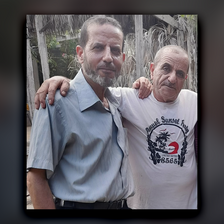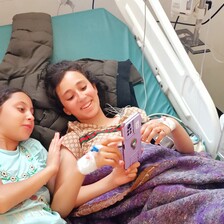The Electronic Intifada 3 December 2023

Children are being robbed of their childhood in Gaza.
APA imagesEvery minute signals danger in Gaza.
Every day feels like a struggle for survival.
My thoughts always turn to my nephews and nieces.
I have 10 of them. The oldest is 14, the youngest is 3.
Children are being killed constantly in Gaza.
Each time I hear an explosion, I am haunted by images of children who have been killed in this genocidal war.
What if one of my nephews or nieces is next? I can’t stop thinking about that.
When the all-too-brief truce came into effect, my family had some internet access.
I immediately called my parents and my siblings, who live in southern Gaza.
After three weeks of being disconnected, I was finally able to talk with my nieces and nephews. What a blessing!
Let me tell you about three of them: Tala, Zein and Yara.
Their childhood has been held hostage to Israel’s war.
Every time a door bangs, they jump up scared.
Every time they hear a loud noise, they look up and shake.
Parents everywhere worry about the physical and mental health of their children. In Gaza, it is impossible to provide a safe environment for your children.
Tala
Tala is 14 and has big dreams. She wants to be a doctor.
She loves to learn. But this war has brought her education to a halt.
At the beginning of the war, Tala and her family were forced to move to her grandmother’s house. Her grandmother lives in southern Gaza.
Tala’s new living arrangements were – and this is a major understatement – far from ideal.
Her grandmother’s house was overcrowded. Tala missed her own room, where she had a comfortable desk for doing her homework.
When she spoke to me, I could sense the desperation in Tala’s voice.
“I want to go back to my bed and my desk,” she said. “I want to do my homework and go on a school trip.”
In her grandmother’s house, it was even hard to go to the bathroom.
Despite the chaos and fear that surrounded her, Tala continued to study. It was her only escape from the endless reminders of the war.
But studying was extremely hard. The lack of electricity and internet access made it difficult.
And the noise and limited space in her grandmother’s house made it hard to concentrate.
Tala’s health suffered too. When I spoke to her, she had been sick for over a week.
She had a sore throat and a high temperature that went up to 39.5 degrees Celsius.
Her parents couldn’t take her to hospital. It was too dangerous and there was a lack of transportation.
They couldn’t even provide clean water to drink.
Her parents said – with a blend of anger, exhaustion and helplessness – that they couldn’t do anything but pray.
“I thought I was going to die,” said Tala. “Maybe that would give me some rest.”
I was lost for words. What kind of world do we live in if a child starts thinking of death as a way to take a break from reality?
I asked Tala why she wanted to be a doctor.
“I want to become a doctor so that I can help the people who get injured in war,” she said.
I couldn’t help but be touched by her courage and resilience.
Zein
Zein is a spirited 11-year-old boy who loves playing football and riding his bike.
For many consecutive weeks, Zein hasn’t been able to move out of his room. His world has shrunk.
Every passing minute feels like an eternity.
In one video call with Zein, he told me that he wanted to sneak out and play with his friends. I could sense the frustration and anger in his voice.
Zein did not seem to grasp the reality of the situation outside.
That was before Zein saw photos of children killed by Israeli airstrikes. He then became too scared to go out.
In one conversation, he said to me, “Uncle, can you please end this? I want to play. I want to cycle from here to America.”
His words broke my heart. I told him that it will end soon.
My sister Nermeen – Zein’s mother – told me that Zein frequently sleeps sandwiched between his parents. Despite his claims to the contrary, Zein is terrified of explosions.
His mother frequently tries to comfort him with hugs. But he still trembles.
“The other night Zein cried when a bomb fell close to us,” Nermeen said. “He ran to my lap and said ‘please, Mom, don’t let them bomb us, please don’t let them bomb my bike.’”
Zein has nonetheless continued to insist that he is not afraid. If a warplane ever came close to his house, he would hit it with his ball, he said.
He might try and sound tough. But his voice was quivering and his eyes were filled with tears.
Yara
Yara is a 10-year-old girl with a talent for drawing and painting.
She pays great attention to what she wears and to her hair. Before the war, she was energetic and talkative.
Yet on a recent video call, Yara barely spoke.
Her mom Noor started showing me Yara’s drawings, placing them one after another in front of the camera. I found hope in the vibrant colors and intricate details of her artwork, a glimpse into her thoughts and emotions.
When I asked her why she draws, her answer was simple but profound. “I love to,” she said.
At that moment, her face lit up.
From speaking to her parents, I learned that Yara had seen a photo of a classmate on social media and that her classmate had been martyred. Her innocent mind couldn’t process how a friend could disappear in the blink of an eye.
Yara had used drawing as a means of escaping the terrible reality in Gaza. Her parents provided her with art materials.
But in the current circumstances, they have to prioritize food and other necessities. When I saw Yara’s table, I noticed she had only a few sheets of paper and some broken pencils to worth with.
Her talent shone through nonetheless.
While I was talking to her, someone shut a door quickly. Yara put her hands on her ears and closed her eyes tightly.
She was clearly traumatized.
I felt heartbroken. I wanted to replace the world she lives in with a better one.
The atrocities of war leave an indelible mark on children like Tala, Zein and Yara. Countless other children are experiencing similar pain.
Childhoods that were once carefree have been stolen. The only thing that can be said with certainty about the future of Gaza’s children is that – provided they survive this war – it will be filled with fear and anxiety.
Yet in their darkest moments, children cling to hobbies and activities, hoping to find solace away from the horrors of war.
The author is a writer, photographer and video editor from Gaza.





